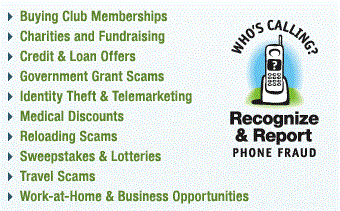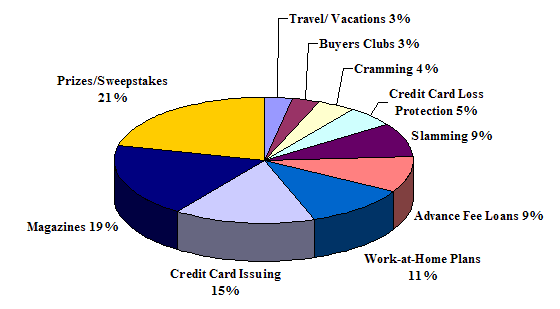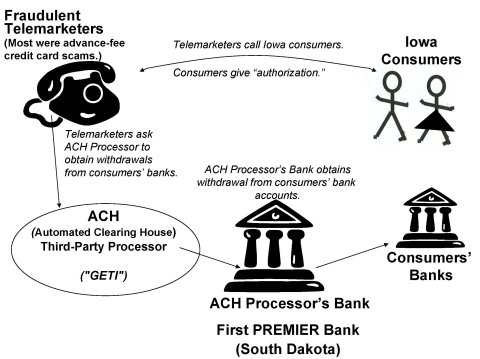|
I know everyone reading this has probably more times than none received a call from someone trying to scam you. I know I have a least a million times. I can't tell you how angry I get when someone calls me trying to scam me on the phone out of my own money or trying to get information that no one should know except for myself or if I am applying for work. For example, 97380019726 seems to be running a scam from abroad. You can read more about this scam on http://findwhoiscalling.org/phonenumber/97380019726. These telemarketers try and sweet talk you into giving them your bank details. You should be careful. There are more spam numbers listed on the website if you click on the links. There was one time my grandmother was even scammed and it broke my heart! I lived out of state at the time and they called her acting as if they were me trying to get money from her they lied, and told her, "Grandmother it's Priscilla I have been arrested I need to be bailed out." My poor grandmother said the girl sounded exactly liked me and named the only few friends that I had up there so it was very believable.
She sent this scammer a $4000 money order and never seen that money again. Seeing these scammers prey on the elderly really breaks my heart and makes me think the worst of humanity. Please do not ever give out confidential information about yourself over the phone especially information such as your social security number, addresses, or anything else that only you or a potential employer should know or need because this is giving free access to any scammer who runs across your information. Always take extra precaution because you honestly never know if this potential phone call you are receiving is actually a scammer or not and most the times it is very difficult to differentiate the two. The first thing you should do is google the phone number and see what other people are saying.  At some point in your life, you will, unfortunately, get a call from a mysterious telemarketer trying to sell you (mostly fake) offers. These callers usually go after the elderly community due to their deeper pockets than average college students. However, these calls are anything but innocent since personal information can be leaked such as social security numbers, addresses, and even bank account. Some of the most common scams deal with counterfeit checks, fake grandchildren, grants from the government, secret shoppers, and fake dates. Counterfeit Checks This is a physical scam in which you would receive a (counterfeit) check in the mail, call the number associated with it and be asked to deposit it into your bank account to wire a portion of it overseas to another account. Most of the time the deal seems too good to be true since you can "earn" a profit of the check. However, by the time you transfer it over the scammer's number is out of service and the bank can't undo the transfer you just made putting you in a lot of financial trouble. Grandchildren Scam One of the most common scam since elderly folks are targeted more often is where the telemarketer calls an older person claiming he/she is their grandchild. They will say that they are in serious financial or legal trouble and need cash to be wired to them immediately. The scammer most of the time gets the person's grandchild's information through social media to make it seem more realistic. Grants From the Government Usually, with this scam a telemarketer calls a student and announces they won a popular government grant and can receive it when they tell them all their bank info and social security number. The advice by the DOJ is to not entertain such calls. Once the "bank info goes through" the telemarketer hangs up and the victim will see a nasty number of transactions on their bank account. The best thing to avoid this situation is to just hang up or ask for verification. Secret Shopper The secret shopper scam happens when you receive an email to be a secret shopper and to please test their payment systems. The victim will receive a check for a couple hundred dollars and be told to wire a certain percentage of it overseas. Once the wire transfer is complete the victim realizes the check is counterfeit and owes an excess amount of money. Dating Scam Once of the saddest scams, the victim receives a message from "the love of their life" asking for a couple hundreds of dollars to "test their love." Unfortunately, in most cases, the victim falls for it and is out a couple hundred dollars as well as a lover. Best case scenario, stick to real dating, not the online stuff. Every now and then everyone receives unwanted phone calls from telemarketers. Telemarketing companies are coming up with different tricks to con people. The telemarketers primarily target the elderly and other individuals who have applied to fake sweepstakes or other known scams. It is important to be aware of different scams that come from telemarketers.
Sweetheart Scams The sweetheart scam happens when you get contacted from a telemarketer from overseas, who has seen some of your personal information you put on social media. This "sweetheart" uses phone and email conversations to create a friendship that will eventually bloom into a romance. Once you have been smitten by the telemarketer, they tell you that they're in prison or at the hospital and they want you to wire some money to them. Guaranteed Grants When a guaranteed grant from the government scam happens, telemarketers will call you and tell you that you are qualified for a free guaranteed grant because of your age, where you live or your employment status. A Telemarketer will ask you a few questions such as do you have a criminal record? After you answer all of the questions, they will ask for your bank account information to deposit the grant into your account. In reality, they will never deposit your information. People that fall for this scam often lose several hundred dollars. Money Mule Scam This is a very common scam. You are told that you can get money by providing overseas money services. The telemarketer says If you sign up you will receive cash and wires across America. Your job would be to forward the funds internationally using a wire transfer, and you get %10 percent commission. The truth is you are taking money from the elderly fraud victims, and you will be wiring cash to the scammers. As recommended by the AG never give out personal information over the phone. Secret Shopper Job There is such a thing as being a secret shopper, but telemarketers will call you and invite you to become a secret shopper. You will be given instructions on how to test the MoneyGram transfer and you will get a check for seven thousand dollars. They will ask you to deposit the seven thousand dollar check into your account and fill out a questionnaire. The scam comes after you make a deposit. Your bank will say that your check has bounced and your account will show the amount you owe. Dealing with phone scams can be really annoying and may disrupt your day. The key to dealing with telemarketers is to not pick up your phone for unknown numbers. Never give out personal information over the phone and always be aware of who you are talking to. Being mindful of telemarketing scams and tricks can help you deal with those unwanted phone calls.  Telemarketer frauds are scam gaining popularity in the 21st century because of the increased technological development. It targets the elderly, young and new citizens that are not aware of the fraud. Perpetrators tend to pause a genuine interest of help to the victim, requiring confidential information. In turn they are then motivated by being given the variety of exciting option. Unknowingly victims they can share their secrets by purchasing non existing product. There are common telemarketer scams and these are evident because with the recent technological development everyone is linking all money avenues with the phones, online transfers or cards. There is also a lot of exchange of private information on social media, gaming site, online banking, shopping site, and general websites/pages unknowingly which make a lot of people vulnerable to telemarketer frauds. This has therefore helped the scammers to easily target their victims without fear. 1. Bank Account Telemarketer Frauds: This is a fraud targeting customers of given banks indicating change and sale of certain promotional products. This could include loans and advance scams that require customers to pay a certain amount of money. 2. Promotion Telemarketer Frauds: Promotions are there to increase sales of a certain product and this has been taken advantage of by giving an accelerated discount to woo the potential customers. It is mostly done when there is a national promotion by any given firm and this therefore is seen as the best time as it cannot be differentiated from a scam. 3. Gaming and Lottery Telemarketer Frauds: This is an arising scam that notifies the players they have won a given betting. Considering the desire and the willingness to win, one is hence found at the center stage of the fraud. 4. Import and Export Telemarketer Frauds: As there is always an import or an export, a customer dealing with it may at times be fraud as perpetrators tend to assign a given cargo pausing for payment through Western Union or MoneyGram. 5. Credit Card/insurance fraud through Identity theft: Here the scam artist calls to sell insurance to the victim posing as a concern insurance agent on credit card fraud. This creates fear on the victim making them purchase the insurance cover. 6. Checks Counterfeiting: happens when the victims receive a counterfeit check in the mail but the telemarketer’s frauds call the victim later to confirm the check making the victim believe the checks are real. The victim is later asked to deposit the check and wire the fund to someone else and before the bank process the check to know that its counterfeit, the money is already gone from the account. Telephone and mobile users should always be alert from the incoming calls, texts and emails to prevent the spreading telemarketer scam from exploiting them. Despite the measures being put in place, a lot of awareness and support is required to sensitise the people about the possibility of being defrauded using the telephone. Lets just call me Mister S because thats what I am known as at work. I work in a factory farm style call center with more than 2500 workers dialling over a 100000 calls every day.
I don't have much going on in my life. I spend most of my time on the computer so I figured I will start a blog and show people what happens in a call center day in day out. More to come very soon :) |


